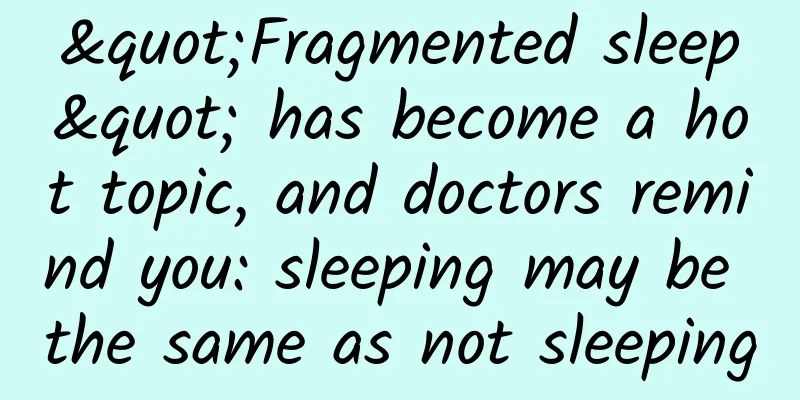"Fragmented sleep" has become a hot topic, and doctors remind you: sleeping may be the same as not sleeping

|
How's your sleep? In recent days, there have been many discussions about “fragmented sleep”. Related topics continue to attract attention The harm of “fragmented sleep” should not be underestimated The severity is equivalent to staying up late It can easily lead to metabolic syndrome Disrupts the body's metabolism Including abnormalities in glucose metabolism This may lead to problems such as high blood sugar or high blood lipids. At the same time, "fragmented sleep" will also have adverse effects on the cardiovascular system. Bringing huge pressure Staying up late or having fragmented sleep increases Suffering from Alzheimer's disease, etc. Risk factors for degenerative diseases in the elderly Doctor: It affects relaxation, metabolism and memory "Fragmented sleep", as the name suggests, refers to interruptions or multiple awakenings during sleep due to various reasons. Compared with the short "micro-awakening" that only lasts for a few seconds and you may not remember it, the characteristic of "fragmented sleep" is that you can be very clearly aware of "waking up" and you have to struggle to fall asleep again after waking up. For some people, "fragmented sleep" also occurs on the eve of important and exciting events. Many people are easily "too excited to sleep", and every time they wake up, they find that only one or two hours have passed. At the same time, some parents who take care of newborns or workers who work night shifts are more likely to experience long-term fragmented sleep. During fragmented sleep, people cannot enter the deep sleep stage, but are in the sleep-deprivation stage and light sleep stage. Therefore, waking up at this time is not enough to relieve fatigue, is not conducive to the brain clearing away garbage, and will also affect the body's metabolism. Experts explain that this is also why people who suffer from long-term "fragmented sleep" are prone to symptoms such as drowsiness, memory loss, and inattention during the day, and may even further induce metabolic, cognitive, cardiovascular, and immune system problems. For people who have sleep problems, there are two main approaches: drug intervention and non-drug intervention . If there is no organic disease, it is a family hereditary or sporadic gene mutation disease, and it is a congenital sleep disorder that can be diagnosed, and the only way to ensure the necessary sleep is to use drugs. In addition, some stubborn sleep disorders or sleep disorders during special periods can be treated with medication under the guidance of a doctor. But for other patients, it is usually recommended to try non-drug intervention first. Experts say that it is important to create a necessary sleeping environment in daily life, and the key is to avoid strong light stimulation and noise stimulation. "For example, the principle of white noise is to form repeated stimulation of the same rhythm, which is monotonous and repetitive. For the brain, boring things are indeed conducive to stimulating sleep response and assisting sleep." Do you experience sleep fragmentation? Have you ever experienced that you wake up many times for no apparent reason during sleep and find it difficult to fall asleep again each time you wake up? This is called "sleep fragmentation". So how do you determine the severity of your sleep fragmentation? You can record your sleep data and then apply this formula: sleep efficiency = sleep time / time in bed . For example, if you go to bed at 11pm, fall asleep at 12pm, and stay awake for an hour, you wake up at 7am the next day. Generally speaking, sleep efficiency is divided into three levels: high efficiency: 90%-100%; normal efficiency: 85%-90%; low efficiency: below 85%. The lower the sleep efficiency, the more severe the degree of sleep fragmentation! How to improve sleep fragmentation? According to Life Times, a new study recently published in the British Medical Journal proposed an effective way to improve sleep: Performing fragmented, short-duration "lightweight" resistance training in the evening - squats, calf raises, knee raises and hip extensions - can extend sleep time that night by nearly 30 minutes. Bodyweight resistance training consists of three movements that require no equipment and can be performed using only your own bodyweight: 1. Stand with your knees raised and hips extended. When standing, raise the knee of one leg, open the raised leg outward (right leg to the right, left leg to the left), then bring it back and put it down; 2. Squat, imitating the action of sitting on a chair, but don't really sit on it, and make sure your knees don't exceed your toes; 3. Raise your heels, that is, stand on tiptoe. Each movement takes 20 seconds, and it takes 1 minute to complete all 3 movements. Repeat 3 rounds, each time only taking 3 minutes, and do it every 30 minutes. Finally, I wish everyone can sleep well until dawn! |
Recommend
Kuku said that money created a Douyin account and on the 4th day, a project that everyone can copy was exposed
Kuku said that money had set up a Douyin account ...
Online travel: Where is the next trend?
When Liang Jianzhang returned to Ctrip in 2013 , ...
Promotion effect is unstable? Account performance optimization method!
While promoting information flow, the effect sudd...
What are the methods of product promotion?
Now that the product has reached maturity and has...
The Zhijie S7 cannot be delivered and cannot be charged. Are Chery and Huawei unable to join forces?
It is said that "it is good to sit under a b...
What kind of clam is the mulberry wine in "The Eternal Moon"?
Recently, the Xianxia drama "Chang Yue Jin M...
The commercially available "Anime House" based on CrossApp is officially open source
The commercially available "Anime House"...
A complete QQ group marketing promotion plan
A friend of mine who works in the gray industry o...
Operational promotion: How to increase active users?
Having a growing pool of active users is the ulti...
Passwords become obsolete technology Microsoft will support unlocking computers with mobile phones
In the era of mobile Internet, online life is bec...
Do you still remember the text message you left in the corner?
[[141286]] At the end of June, Matti Makonen, a F...
Crab: I am cooked and red
Produced by: Science Popularization China Produce...
How does Baidu bidding respond to the reduction in promotional spaces?
Introduction Recently, some changes have taken pl...
Kuaishou advertising, Kuaishou advertising account establishment, Kuaishou advertising resource location
Kuaishou, a short video social platform, has achi...
Ideal Auto released its financial report and achieved profitability for the first time, with revenue increasing by 65% in the fourth quarter
Li Auto, one of the new Chinese car makers, repor...








![Operation system [Introduction]: How to do promotion and marketing?](/upload/images/67cc2c0e629ad.webp)
